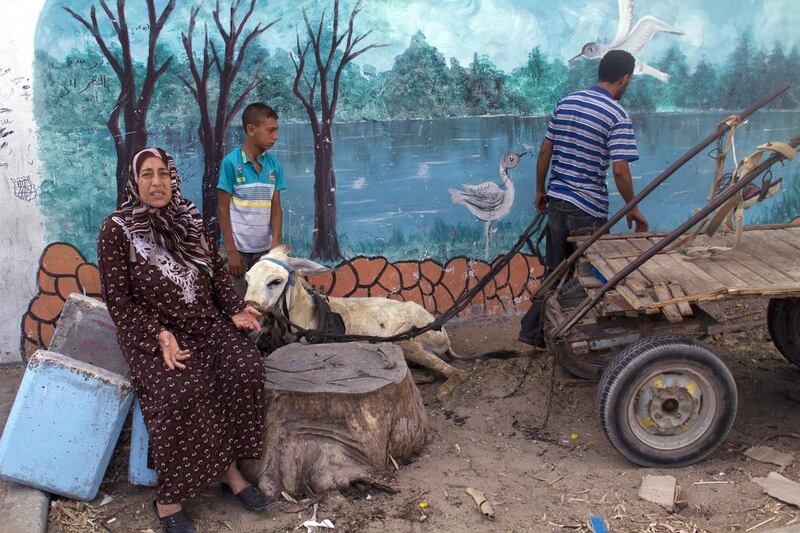GAZA CITY // Hamas wants Israel to stop its military operations, lift its siege of the Gaza Strip and release jailed Palestinians in return for an end to the seven days of hostilities that have devastated Gaza.
With Israel unlikely to agree, Hamas is in a risky position.
The group will probably now be forced into a ceasefire deal that falls below the expectations of Palestinians, who have paid a heavy price in terms of civilian casualties during the bombardment of Gaza.
“They’ve really caught themselves out on a limb and it’s not clear how they can climb down from it,” said Mark Heller, research associate at the Tel Aviv-based Institute for National Security Studies.
Hamas officials began voicing their requirements for a cessation of hostilities shortly after the fighting between militants and Israel began on Tuesday. Thus far at least 184 Palestinians have been killed and more than 1,200 wounded.
One of the demands include setting free the more than 50 Palestinians whom Israel rearrested last month after releasing them as part of the 1,027 prisoners exchanged in 2011 for Gilad Shalit, the Israeli soldier captured by Hamas in 2006.
Another is the long-standing demand of Gaza’s 1.7 million people that Israel lift the punishing siege that was imposed after Hamas seized control of the territory in 2007.
More recently, the siege has been tightened by Egypt, which destroyed the vast majority of tunnels that brought Gazans everything from cheap fuel and commodities to weapons used by militant factions. The territory’s already brittle economy subsequently nosedived.
Hamas has also demanded a halt to the regular airstrikes and naval bombardments that Israel carried out on Gaza long before the fighting began a week ago.
On Monday, Moushir Al Masri, a Hamas spokesperson, said additional conditions would be raised by Hamas during ceasefire negotiations.
“We refuse to disclose the details of these new conditions, but we will continue to defend ourselves against the occupation [Israel] until we achieve our rights,” he said.
That fighting includes the firing of more than 1,000 rockets at Israel, including long-range missiles that have stirred panic among Israelis. Yet the rockets have not killed a single person, partly because of the Iron Dome missile-defence system that Israel’s military says has intercepted 201 of them.
That has spared Israel the pressure of needing to respond to large numbers of civilian casualties and threatens to weaken Hamas’s hand in ceasefire negotiations, said Hani Habib, an independent analysts in Gaza.
Even before the war, Hamas was already weakened, especially by the Egyptian destruction of its smuggling tunnels. That weakness persuaded Hamas to sign onto a renewed reconciliation agreement with the Fatah movement of the Palestinian Authority president, Mahmoud Abbas.
It may also have compelled the group to start fighting when it became clear that there were few benefits to the reconciliation deal with Mr Abbas. The trigger for its latest barrage of rockets was Israeli attacks on Gaza and mass arrests of Hamas members in the West Bank in response to the killing of three settlers in the occupied territory.
But while the Islamist group’s tough fighting with Israel has given it a popularity boost among Palestinians wanting to hit back at it, at the expense of Mr Abbas’s standing among his people, Mr Habib doubted whether Hamas could leverage substantial concessions from a ceasefire.
One reason is that Egypt’s president Abdel Fattah El Sisi is reportedly involved in ceasefire talks. He may adopt a tougher line against Hamas, an offshoot of Mr El Sisi’s Muslim Brotherhood rivals, than the one Cairo took when it brokered a ceasefire that ended the 2012 Israeli-Hamas conflict.
“If Hamas doesn’t get substantial concessions from a ceasefire, then it and the other factions joining it in resisting Israel will lose. But it will an even bigger loss for the Palestinian people, and they will start asking why so much blood was lost” for few results, said Mr Habib.
Public frustration had been mounting in Gaza before the fighting.
Hamas has admitted it being unable to pay the salaries of its 50,000 employees in the territory. On top of this, worsening power outages and fuel shortages caused tempers to flare.
"People were openly cursing Hamas in the streets," said Akram Attallah, a columnist for the Ramallah-based Al Ayyam newspaper who lives in Gaza.
“People have quieted down because of the fighting, but that anger is still there and it will return, especially if the situation returns to how it was before the war.”
He said the one clear effect this war had on Israel was the frustration that it has caused among the international community, which has grown tired of Israel’s expansion of settlements on occupied Palestinian land. It is widely blamed for thwarting Israeli-Palestinian peace talks in April.
“In a way, the world sees this war as proving that [Benjamin] Netanyahu has turned his back on the international community and peace with the Palestinians,” Mr Attallah said in reference to the Israeli prime minister.
hnaylor@thenational.ae





